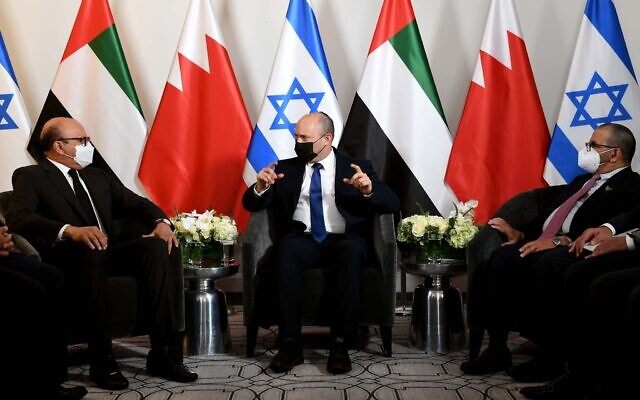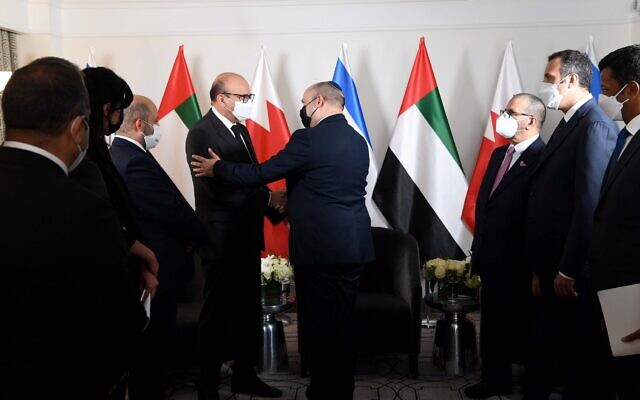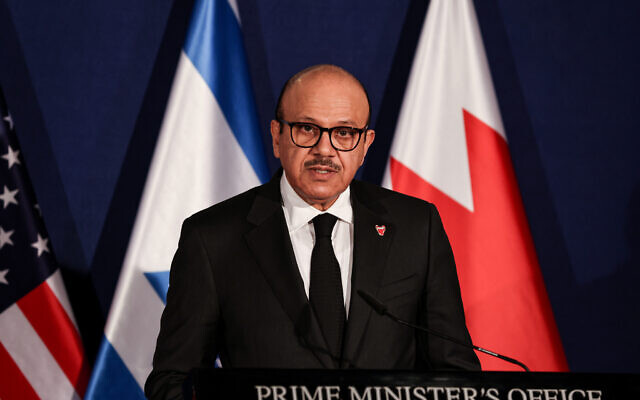Meeting with senior Gulf officials in New York ahead of UN speech, prime minister promises stability and continuity in relations; UAE expects trade to top $1 billion this year

NEW YORK — Prime Minister Naftali Bennett met with UAE Minister of State for Foreign Affairs Khalifa al-Marar, and Bahraini Foreign Minister Abdullatif Al Zayani at his hotel in New York on Sunday evening, telling them that Israel’s original Arab peace partners support the Abraham Accords.
“First of all, I want to tell you that I met the king of Jordan and the president of Egypt, and they’re of course delighted with the ensuing relationship between our countries, and I want to ensure you of continuity,” Bennett said, sitting between the diplomats and their staffs.
“We’re stable and we believe in this relationship and we want to expand it as much as possible,” Bennett said of the US-brokered accords that were signed by his predecessor Benjamin Netanyahu.
But while Netanyahu spearheaded the Abraham Accords, ties with Egypt and particularly Jordan, the only other two Arab countries to sign peace deals with Israel, were strained during his decade in office.
Bennett met Egyptian President Abdel Fattah el-Sissi in Sharm el-Sheikh earlier this month. The summit was the first in a decade between the two countries’ leaders, and Sissi welcomed the new Israeli prime minister publicly and warmly.
Bennett also met secretly with Jordanian King Abdullah II in July at the crown palace in Amman, in the first summit between the countries’ leaders in over three years.

Bennett sat down with the diplomats ahead of his speech Monday morning at the United Nations General Assembly.
“I felt it’s important that we meet after the year of the Abraham Accords,” said Bennett,” which, from our perspective, is very meaningful.”
“We need to work forward together to send that message,” said Zayani.
“Please send my best regards to His Majesty, and I’m looking forward to meeting him,” the prime minister replied.
Marar noted how quickly relations between the UAE and Israel have developed, saying that there has been almost $700 million of trade since the accords were signed, and that he expects that figure to reach almost $1 billion this year.
“In a short period of time,” he said, “in the span of one year, we have made a lot of achievements,” he said, calling the progress “amazing.”
“It’s looking good,” replied Bennett to laughs. “The Israelis like coming over, and I need them to stay in Israel,” he said referring to efforts to limit travel and curb the coronavirus.

Because Bennett is speaking on the last day of the two-week gathering, almost all world leaders have left New York, leaving him to meet with officials at the ministerial level.
Bennett will seek to portray Israel as a global player whose expertise can offer solutions to pressing world problems during his speech, a senior adviser said.
Bennett’s first UN General Assembly address will focus on the “Israeli ethos of action, of solutions, of innovation, of optimism,” the adviser said during a phone briefing from New York City on Sunday. The speech will also address “Israel’s place in the less sympathetic region we live in, and Israel’s place in the wider global context, where there is good news and there is bad news.”
Iran’s nuclear program will also be a focus of the speech, with the message that the time has come for concrete action.
The accords, signed in 2020, normalized relations between Israel and the United Arab Emirates and Bahrain. Since then, Morocco and Sudan have also signed normalization agreements with the Jewish state.
While relations with the UAE, Bahrain and Morocco have progressed rapidly, ties with Sudan have moved ahead haltingly.
Sudan’s foreign minister downplayed the country’s emerging ties with Israel, saying that there are currently no plans to establish an Israeli embassy in Khartoum.
In an interview published with The National Sunday, 11 months after the announcement of normalization between the countries, Mariam al-Sadiq al-Mahdi said that there is “not any sign of normalization with Israel.”
Nonetheless, in April, the Sudanese cabinet abolished a 63-year-old Israel boycott law. And last week, Sudanese authorities seized assets of companies linked to the Hamas terror group, which rules the Gaza Strip.
Al-Mahdi said that Sudan agreed to normalization so as to improve economic ties with the rest of the globe by becoming a member of the World Trade Organization.
As reported by The Times of Israel
